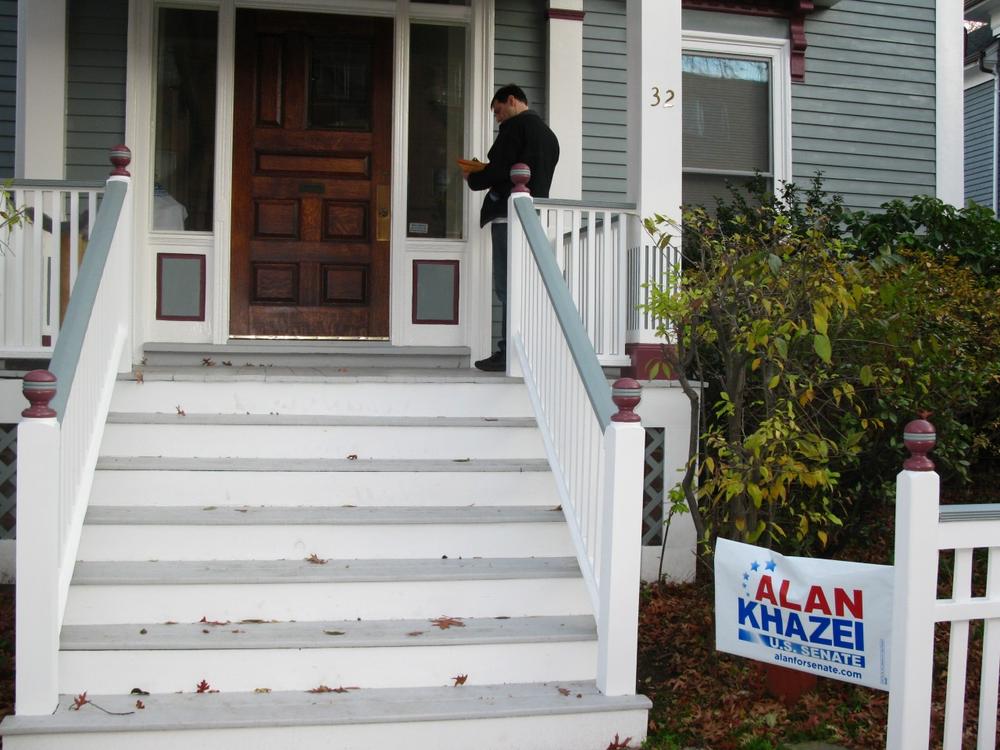Advertisement
Coakley's Challengers Pin Hopes On Getting Their Voters Out
ResumeAlan Khazei's campaign is doing things the old-fashioned way. Every weekend, dozens of volunteers knock on doors for the City Year co-founder.
Tony Mack's day job is grass-roots organizer for hire, but in this case, he's a volunteer.

"We're identifying supporters and we're doing persuasion," Mack says. "There are so many people who are undecided right now. I've never seen an election where you get this close to the election and most people seem to be undecided."
"I really felt like with a really good grass roots campaign, because so many people are undecided, he can definitely win," Mack adds.
On some days, Khazei's campaign has more than 500 people show up to volunteer.
Over Thanksgiving weekend, it knocked on more than 6,000 doors. When Ingrid Schorr opened her door in Cambridge, Mack was armed with a new sales pitch.
"Did you know that the Boston Globe endorsed him?" Mack asked.
"No," Schorr said, sounding surprised.
"Isn't that amazing?" Mack said.
"Thought they were going Coakley," Schorr said.
Mack doesn't waste his time. He only knocks on doors belonging to voters with a history of showing up in Democratic primaries. In a building with a dozen apartments, he rings maybe one door bell. The campaign does these canvasses from 22 offices around the state. Meeting voters face to face, that's the tool they're using to build the Khazei campaign.
Congressman Michael Capuano's campaign also has a new tool in its tool box: Nightly telephone town meetings. He's reached tens of thousands of people in this way, regular voters in Democratic primaries. They can ask him questions, and twice during the call are asked to press buttons to indicate if they support him, if they want to volunteer and if they want to contribute.
The calls are basically a way to introduce Capuano to voters outside his district. His campaign is counting on phone banks as well as door-to-door knocking to identify supporters and get them out to vote. Capuano is also counting on the support of the state's two largest teachers' unions.
"We have 107 000 members across the state," says Ann Wass, the president of the Massachusetts Teachers' Assocation. The union organized one telephone town hall meeting just for teachers. Wass recorded a robocall and the MTA sent two mailings to members.
I ask her how effective the union endorsement is. How well do the teachers toe the line?
"Our members all make their own decision, and hopefully most of them will follow it," she said.
At Lexington High School, none of the teachers I spoke to are planning to volunteer, but history teacher Richard Colon is leaning towards Capuano.
"MTA's endorsement, they have some influence," Colon says. "I think sometimes we need these short-hand ways of making decisions because we don't all study the issues extensively."
Larry David, who teaches U.S. history and the politics and government course, agrees.
"At this point, I'm kind of conflicted," David said. "I think the endorsement did kind of have an influence on me. I was leaning towards Coakley beforehand. Now I'm not sure which way I'm going to go."
Throughout this campaign, voters might have seen businessman Stephen Pagliuca as the candidate with the deep pockets who has bought a lot of television ads. But Pagliuca, too, is trying to get the vote out. He's counted on field director Matt O'Malley to build in two-and-a half months what can take a year to put together.
"We've done dozens and dozens of house parties around the state," O'Malley said. "It's phone banking. We use a great list in the VoteBuilder software, which is a great way to connect with voters to check their voting history to find out who's going to vote. Obviously, it's the super-voters, the people who never miss an election, that we feel confident are going to turn out to vote. So it's contacting them."
It's also going after the pretty good voters, and the newly registered voters from President Obama's campaign. O'Malley said Pagliuca has hundreds of volunteers who have signed up to get their supporters to the polls next Tuesday. They'll need all the help they get, because they're up against a juggernaut.
On weeknights, members of the Service Employees International Union are making phone calls for Martha Coakley, and on weekends, they're going door to door. Coakley may be the front-runner, but her team is not taking anything for granted. Katie Sullivan, the field director for Martha Coakley's campaign, is all too aware from experience that a good get-out-the-vote effort can change the outcome of the race.
"The reason why I believe so strongly in the get-out-the-vote effort, I was in New Hampshire for Hillary, where we were down in the polls, and we fought back, and we won by three points," Sullivan said. "And I think a lot of that was won on the ground. We had a great operation up there and we were making phone calls, doing door knocks. We were out doing visibility — same exact thing that we're doing here."
For all their preparations, the other three campaigns have a tough job in trying to beat the Coakley campaign. There's evidence that Coakley has the best field organization: She was the only candidate who did not have to pay to gather signatures to get herself on the ballot, and she got her signatures in before everyone else.
This program aired on December 4, 2009.
